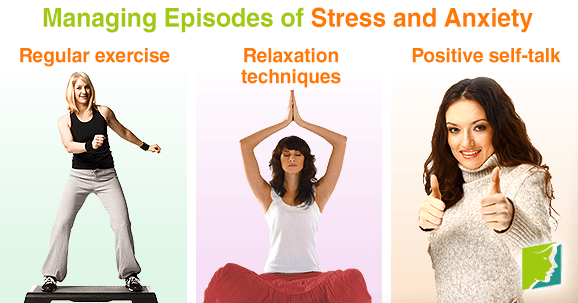Feelings of stress and anxiety affect most people at some point, but for some, frequent episodes can lower quality of life and leave them susceptible to certain diseases. In order to deal with stress and anxiety, it is important to understand why they occur and how to manage them.
What Is Anxiety?
Anxiety is meant to help the brain to react appropriately to certain situations, activating the "fight or flight" response. In most people, anxiety normally recedes soon after the event, but for some, this emotional response can become chronic. At this point, it is considered to be an emotional disorder. Anxiety is often caused by a range of psychological, genetic, and environmental factors, and symptoms can include feelings of detachment, a rapid pulse, and anxiety episodes.
What Is Stress?
In the face of stress, the body releases cortisol and adrenaline, and also suppresses certain body functions, such as the immune system. The stress response is the body's way of protecting you from immediate dangers, such as a predator, and the sudden rush of adrenaline sharpens concentration and encourages immediate action. However, when this stress becomes chronic, it is bad for the functions that the body has suppressed - for example, a weakened immune system can leave you vulnerable to illness. Therefore, it is essential that chronic stress is dealt with as soon as possible.
How to Deal with Stress and Anxiety
Changes to your habits can help minimize stress and anxiety during the day.
Regular exercise
Exercise encourages the release of serotonin and endorphins, which both elevate mood and reduce anxiety. It also releases pent up energy and tension caused by stress - aerobic exercise is particularly effective at this. In addition, low intensity exercise has also been shown to lower cortisol levels. Exercising for at least 30 minutes each day should keep your stress levels down and your anxiety at bay.
Relaxation techniques
Stress and anxiety cause elevated blood pressure levels, rapid heartbeat, and faster breathing. Learning relaxation techniques helps alleviate stress and anxiety by reversing all of these physical symptoms. It can seem as though you do not enough time for this, but taking just 10 - 15 minutes a day to be alone, let go of negative thought patterns, and let your body and mind physically relax can make a world of difference. The exercise below is one such example, although there are many others.
Progressive muscle relaxation
Take a few deep breaths and then mentally scan your body, working out where the tension lies. Tense these areas and then release - this will loosen them. Then rotate your head smoothly once or twice before rolling your shoulders forward and backwards a few times. After this, allow all the muscles to relax and recall a pleasant thought for a few seconds. Take a few more deep breaths and then exhale.
Positive self-talk
Reversing the negative thinking that contributes to anxiety and stress is very important. These thoughts will only intensify the problem. Therefore, getting into a good habit of positive self-talk and thinking is essential for managing them. The trick is to try and catch yourself whenever a negative thought appears, and then replace it with a positive statement (if possible, say it out loud). It can be helpful to imagine the words you would give a friend in that situation - they would probably be much nicer. Let yourself make slip-ups and be your own best friend. After a while, this positive mindset will become routine.
Implementing these lifestyle changes should help alleviate the symptoms of stress and anxiety in both the short- and the long-term. Medications are riskier and costlier, but if they are necessary, they are best accompanied by improvements in daily habits. Lifestyle changes take effort, but will keep stress and anxiety at bay.
Sources
- Anxiety and Depression Association of America. (2014). Tips to Manage Stress and Anxiety. Retrieved September 3, 2014, from http://www.adaa.org/tips-manage-anxiety-and-stress
- Hill, E.E. et al. (2008). Exercise and circulating cortisol levels: the intensity threshold effect. Journal of endocrinological investigation, 31(7), 587-591. Retrieved from http://www.ncbi.nlm.nih.gov/pubmed/18787373
- Natural Health Service UK. (2013). Stress, anxiety and depression: Why do i feel panicky? Retrieved September 3, 2014, from http://www.nhs.uk/Conditions/stress-anxiety-depression/Pages/understanding-panic.aspx
- University of Maryland Medical Center. (2013). Anxiety. Retrieved September 3, 2014, from http://umm.edu/Health/Medical/AltMed/Condition/Anxiety#ixzz3C5GjFayb
- University of Maryland Medical Center. (2013). Stress. Retrieved September 3, 2014, from http://umm.edu/health/medical/reports/articles/stress




